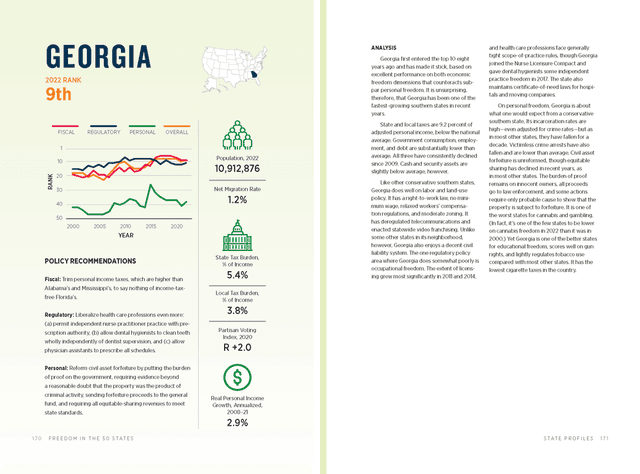Policy Recommendations
- Fiscal Trim personal income taxes, which are higher than Alabama’s and Mississippi’s, to say nothing of income-tax-free Florida’s.
- Regulatory Liberalize health care professions even more: (a) permit independent nurse practitioner practice with prescription authority, (b) allow dental hygienists to clean teeth wholly independently of dentist supervision, and (c) allow physician assistants to prescribe all schedules.
- Personal Reform civil asset forfeiture by putting the burden of proof on the government, requiring evidence beyond a reasonable doubt that the property was the product of criminal activity, sending forfeiture proceeds to the general fund, and requiring all equitable-sharing revenues to meet state standards.
Analysis
Georgia first entered the top 10 eight years ago and has made it stick, based on excellent performance on both economic freedom dimensions that counteracts subpar personal freedom. It is unsurprising, therefore, that Georgia has been one of the fastest-growing southern states in recent years.
State and local taxes are 9.2 percent of adjusted personal income, below the national average. Government consumption, employment, and debt are substantially lower than average. All three have consistently declined since 2009. Cash and security assets are slightly below average, however.
Like other conservative southern states, Georgia does well on labor and land-use policy. It has a right-to-work law, no minimum wage, relaxed workers’ compensation regulations, and moderate zoning. It has deregulated telecommunications and enacted statewide video franchising. Unlike some other states in its neighborhood, however, Georgia also enjoys a decent civil liability system. The one regulatory policy area where Georgia does somewhat poorly is occupational freedom. The extent of licensing grew most significantly in 2011 and 2014, and health care professions face generally tight scope-of-practice rules, though Georgia joined the Nurse Licensure Compact and gave dental hygienists some independent practice freedom in 2017. The state also maintains certificate-of-need laws for hospitals and moving companies.
On personal freedom, Georgia is about what one would expect from a conservative southern state. Its incarceration rates are high—even adjusted for crime rates—but as in most other states, they have fallen for a decade. Victimless crime arrests have also fallen and are lower than average. Civil asset forfeiture is unreformed, though equitable sharing has declined in recent years, as in most other states. The burden of proof remains on innocent owners, all proceeds go to law enforcement, and some actions require only probable cause to show that the property is subject to forfeiture. It is one of the worst states for cannabis and gambling. (In fact, it’s one of the few states to be lower on cannabis freedom in 2022 than it was in 2000.) Yet Georgia is one of the better states for educational freedom, scores well on gun rights, and lightly regulates tobacco use compared with most other states. It has the lowest cigarette taxes in the country.

